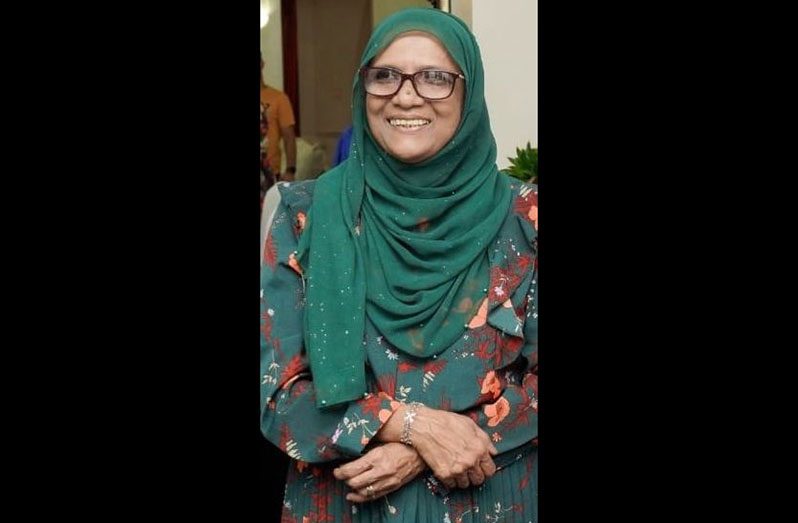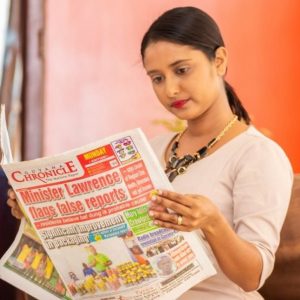– Bibi Shariman Neshaw Ali
FROM the moment she stepped into the teaching profession 49 years ago, Bibi Shariman Neshaw Ali has continued to work tirelessly towards the advancement of Guyana’s education sector, helping to mould the minds of thousands of children, their parents, and young teachers who are now starting out.
Not for one moment during this time did Ali ever feel that she lacked the energy and drive to press on in her career, and this was largely due to the positive outlook that she has always kept when approaching her work.
Meditating on the positive impact her efforts were having on the children also served to motivate her, especially as she would see them passing the College of Preceptors exams that she helped to prepare them for when she was just 16 years old- fresh out of school herself.
Growing up in Leguan, Ali was offered a teaching job shortly after completing high school. This meant that she had to leave home and head to the Western Hogg Island Government School. Not only was she going to a strange place as a young girl, but she had no clue that she was expected to teach a multi-grade school, owing to the student population being very small.
Ali was allotted Prep A and B and also had to juggle the responsibilities of teaching English ‘A,’ English Literature and History in the upper classes. Even though teaching the older children who were preparing for their exams was a bit intimidating, as some were just two years younger than her, her positive disposition and good grasp of the teaching content helped her manage well.
Eventually, she would go on to teach at Cornelia Ida Primary and Leonora Primary and Secondary Schools before moving on as a Test Development Officer and Chief Curriculum Development Officer at the National Centre for Educational Resource Development (NCERD). She was then promoted to Assistant Chief Education Officer Primary and Deputy Chief Education Officer Development at the Ministry of Education.
Even in those years when she was out of the classroom, though, Ali continued to work with children, tutoring some of them as they prepared for the Caribbean Examinations Council (CXC) assessment.
The Teaching Instinct
Back in 1973, there were hardly any opportunities for young teachers to be trained or mentored. As sad as this was, it was quite understandable. In Ali’s case, she was one of the two untrained teachers at Hogg Island, while the other three were busy with their own roles and responsibilities; even the headmistress had a class of her own to teach!
A sample book with lesson plans was all the young teachers had to guide them. But this presented no particular challenges to Ali. “Most of what I did as a young teacher was by instinct; all the methods I used were by trial and error and my own intuition,” she reflected in an interview with Pepperpot Magazine.
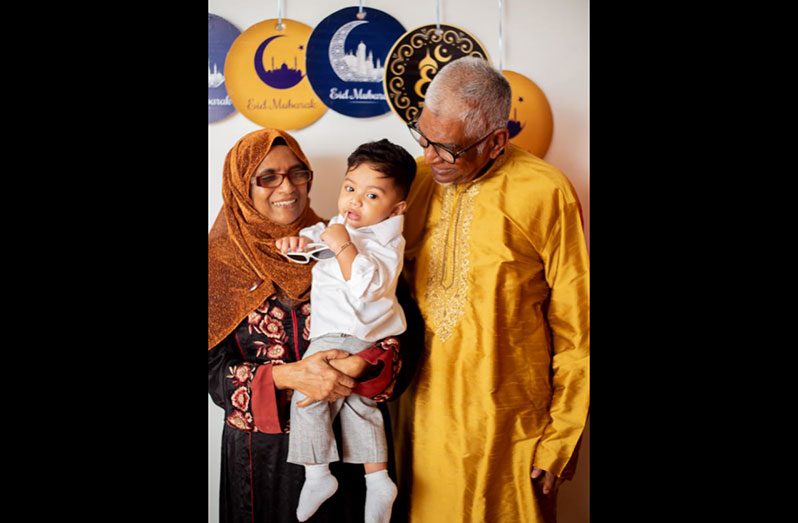
“When I looked at the faces of the children, I felt an affinity with them. I somehow felt closeness to them; as if I really wanted to do something for them. They were so innocent, keen to learn, and easy to get along with,” she continued.
Her fondness for them only grew when she thought of the sacrifices they were making to attend school at such a tender age. “It was a real struggle for them to come to school; they had to paddle boats. Many of them came from far distances. They were making such an effort to get to school, so naturally, I felt the need to do the best I could for them.”
Even though she was not professionally trained, Ali saw that she was helping to make a difference in their lives. The sole fact that they were passing their exams boosted her self-esteem. It motivated her to continue trying her best in the circumstances.
What she found especially helpful was fostering a good relationship with parents and the community. “Even though the students came from distant places, somehow we managed to foster such a good relationship with the parents and the community, and they supported any event that was carried out by the school,” the educator explained.
Personal Connection
“You may have all the qualifications and know all the philosophy of teaching, but if you do not connect with your students, they will not have confidence in you,” Ali believes. “So always try to understand and empathise with them and make a personal connection with them, so that they can feel free to confide in you.”
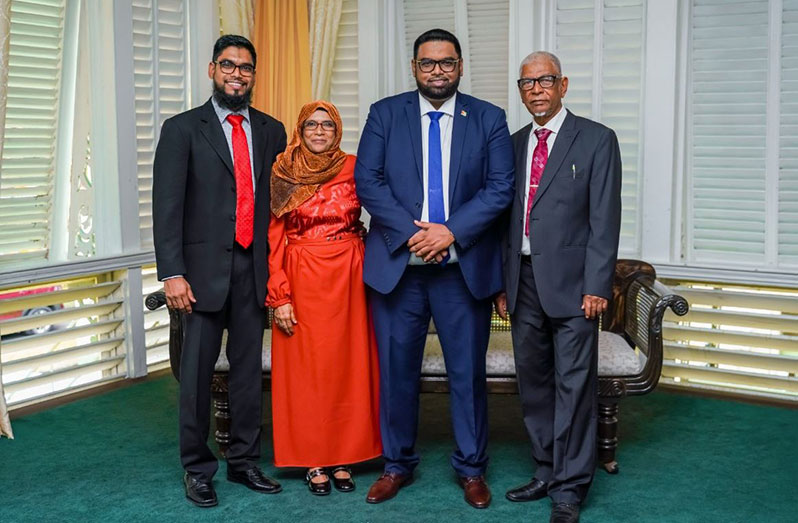
From experience, she’s seen the importance of continuing to learn. In fact, she was still studying well into her 50s. “Never stop learning. Every day, things are evolving, and we have to keep up with the times. Learn about all the tools you can use to enhance your work and always seek help and support if things are not working out for you in the classroom. Talk to your colleagues; you may be surprised to know that they can help you. Never be too shy to ask for help,” she advised.
It is also imperative that teachers refrain from responding aggressively to parents and children, she advised. “Never do anything that will lower a child’s self-esteem. It is very easy for us to cause damage to students by our words and actions. Be very careful about what you say and what actions you take to resolve issues. Let them see you as fair.”
Retirement
Ali officially retired from the Ministry of Education 10 years ago. She knew all along that the time for this was coming and felt sad at having to leave, but at the same time, she was certain that she would continue to serve the sector in one way or another. “I still had that drive and energy. I still felt that I could continue because I cherished the school community,” she recalled.
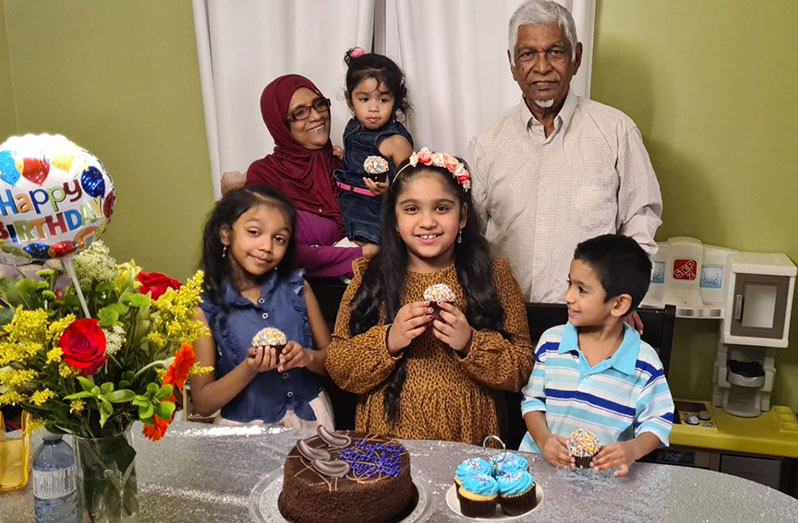
So she became the principal of a private school. During that time, she used the opportunity to mentor, guide, and train young teachers, while still being active in the classrooms. “One might think that they knew everything after being trained, but you would not believe that when they actually go into the practical school situation how many things they need to learn. Most principals should play this role because our teachers still need a lot of help when they graduate from college and even university.”
As she helped the teachers, though, the benefits were mutual. Ali took the time to learn technology and other modern teaching methods.
Having retired from the school last September, she is still actively involved in the lives of children. From time to time, she would do consultancy work that would have a direct bearing on children. “I still feel I have that passion and energy, and I can still do whatever I can to impact the lives of young people. So many students still approach me and ask me to tutor them,” she said.
The President’s mother
“Even though teachers don’t get rich from the profession, seeing our students take their place in society is very gratifying,” Ali remarked, especially as she looked at how her own two sons have turned out: Aqtar Ali, is a Machinist, while Mohamed Irfaan Ali, is the President of Guyana.
Although having a career that took a lot of her time, Ali still managed to create a balance between her family and work responsibilities. “Do not get too overwhelmed and forget the other roles you have in your life. If things don’t go well at home, you will go to school not feeling motivated,” she advised.
Her husband, Mohamed Osman Ali, made it easier for her to create a good balance, as he too was a dedicated educator. In a previous interview with this publication back in 2012, Ali said: “When he went there [Hogg Island], people were hardly interested in education, and he went house to house encouraging parents to get involved. And he used to take his own money and buy biscuits and tea and anything else to encourage the children to study.”
As she looked at her children growing up, it wasn’t hard to see that they would’ve turned out well. Speaking about the now-president, she said: “There was never a doubt that my son had what it took to excel. He was a very confident person; never afraid to meet challenges. He would just dive into them.”
Ali described him as someone who was a risk-taker. “Even though this caused me endless worry as a mother, I realised that it was one of the traits that made him excel. I have to admit that he was not a bookworm, but he had a natural knack to learn quickly. He was very analytical and practical in his approach to problems.”
She continued that she is extremely grateful for how things have turned out for her family. “I do believe that everything that happens is by the will of God,” she mentioned, adding, “I also feel very humbled that someone who came from the countryside and whose parents were teachers could attain the presidency of this country. I am also honoured that my son was able to attain the highest office of this country and that he is given the opportunity to serve all the people of Guyana.”
Describing what she especially loves about her son, the president, she said it is that he loves to have his parents around him. “All mothers want loving and caring children who would find them to spend with them. My son has not disappointed me in this regard. I really appreciate that he is loving, caring, and attentive towards us. He loves having us around him and I just feel so blessed that he’s my son because of the good qualities that he has.”
Ali also shares this love for her son, Aqtar; daughters-in-law, Arya Ali, First Lady of Guyana and Hafeeza Ali; and her five grandchildren.




.png)


